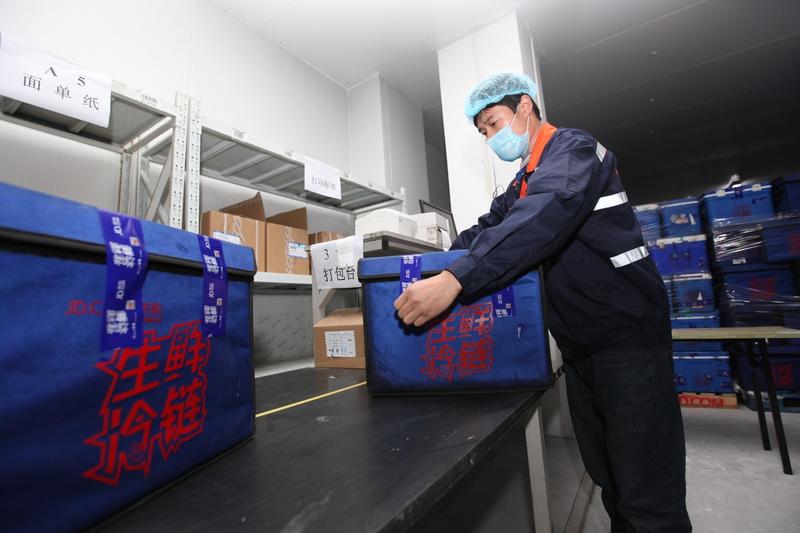 This undated photo shows a JD employee packing fresh food for cold chain delivery at a warehouse in Tianjin. (PHOTO PROVIDED TO CHINA DAILY)
This undated photo shows a JD employee packing fresh food for cold chain delivery at a warehouse in Tianjin. (PHOTO PROVIDED TO CHINA DAILY)
Residents from lower-tier cities and rural areas have shown huge consumption potential and are expected to inject more impetus into China's online retail market during this year's Nov 11 Singles Day shopping extravaganza.
For major e-commerce players, fourth to sixth-tier cities and townships will definitely become new battlefields due to the rise in local buyers' disposable incomes and desire to upgrade their lifestyles by purchasing high-quality imported products, experts said.
Along with the enhancement of logistics and infrastructure, consumption in fourth to sixth-tier cities and townships will rise further, said Wang Zhenhui, CEO of JD Logistics
Chinese e-commerce giant JD said it plans to access consumers in lower-tier cities by selling products at lower prices and providing customer-to-manufacturer products that can better meet specific needs of consumers during this year's Singles Day.
ALSO READ: Double Eleven brings smiles to retailers
In addition, JD Fresh, the fresh food arm of JD, plans to sell about 1.3 million pieces of agricultural products covering more than 800 agricultural industries to help farmers increase production and incomes during the online shopping spree.
During the COVID-19 outbreak, JD has invited mayors, county magistrates and directors of commerce to act as livestreaming anchors to promote local agricultural products in order to help farmers and industries affected by the pandemic.
Wang Zhenhui, CEO of JD Logistics, said in an earlier interview that the company will continue to penetrate into fourth to sixth-tier cities and townships where orders can be delivered directly to doorsteps within 24 hours, while adding that the logistics efficiency improvements will give a big boost to the retailing of its products.
Wang said that along with the enhancement of logistics and infrastructure, consumption in such lower-tier cities will rise further.
In addition, e-commerce behemoth Alibaba Group is banking on Juhuasuan-its group-buying and flash-sale online platform-in an attempt to grab more market share in lower-tier cities and towns across the country during the largest online shopping gala in China.
Xu Feifei, associate partner at global consultancy Prophet, said that while lower-tier cities previously were less brand-conscious and placed more importance on pricing, rising disposable incomes and diversification of spending behaviors will slowly change that.
Xu said that amid hopes of increased demand for high-quality goods and premium services, brands are establishing their presence early in burgeoning markets in China to capture market potential before it fully matures.
RAED MORE: 11.11 gala to boost spending
According to a report from market research firm Nielsen, JD is expected to be the first choice of consumers buying 3C products-namely computer, consumer electronics and communication products-during this year's Singles Day promotion. Some contributing factors to JD's success in this area are the integration of an omnichannel retail ecosystem, acceleration of digital processes and a strategic shift toward lower-tier markets.
"We expect (annual) consumption in lower-tier cities to surge from US$2.3 trillion in 2017 to US$6.9 trillion in 2030," said Robin Xing, Morgan Stanley's chief China economist in a research note.
"These smaller cities could be the engine driving China's overall private consumption market of US$11.8 trillion over the same period."


